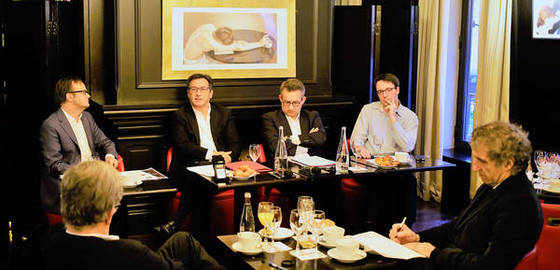Does Trump's Arrival Herald Global Financial Deregulation?
The promise by president-elect Donald Trump to deregulate on a massive scale has prompted lively exchanges in economic circles. Three experts from the sector were invited to prolong such reflection at the breakfast debate organized by HEC Paris and ViaVoice on January 12 at the Café des Editeurs, central Paris. They all underlined the uncertainty provoked by candidate Trump's offensive against Wall Street and the Dodd-Frank Act on financial stability voted in by the Obama administration in 2010 after the subprime crisis it inherited.

Business as Usual
“The history of international commerce is marked by major swings.” The recent statement by Wallonia minister Paul Magnette could be used to describe the about-face by the future White House tenant this past month. During his presidential campaign, candidate Trump had insisted on the “massive” suppression of “anti-growth” regulation, replacing it, he said, by a more “modern” structure. The Trump team denounced over-regulation which, it claimed, cost the US economy two trillion dollars a year.
“Trump and his team have quite a cynical vision of the world,” said Thierry Foucault, HEC Paris professor of finance. “Mr Trump presents himself as a sworn adversary of Wall Street but when you look at his nominations for his future administration you see people like the Treasury Secretary (Steven Mnuchin) is a former Goldman Sachs banker. In this sense, he is upholding a tradition already seen with nominations by Bill Clinton and George W. Bush. It's business as usual.”
Thierry Foucault was joined at the debate by his HEC Paris colleague Guillaume Vuillemey and fellow-economist Philippe Tibi. The three professors were there to answer the central question posed by chairperson François Miquet-Marty (president of ViaVoice): “With only days before Donald Trump takes office, are we heading towards global financial deregulation?” Finance professor at Ecole Polytechnique, Philippe Tibi insisted on the fact that it would be extremely complex to implement the financial deregulation on the scale Mr. Trump is suggesting. “In the past, banks have destroyed an enormous amount of public capital and populations have not witnessed visible sanctions against those responsible in top management. Which explains the birth of protest movements like Occupy Wall Street. The memory of the 2008 meltdown is still present and loans have become extremely controlled.”
Step by Step
Nevertheless, Philippe Tibi believed the Trump administration will seek out small-scale reforms by deregulating selectively. “New regulation, freed of the current red tape, could allow loans for small local banks. It's simple policy to implement and the short-term political benefit for Trump could be major. If it feeds into a crisis that erupts in 5-10 years, well, he won't be around anymore to answer questions.”
This analysis is shared by Thierry Foucault. According to this specialist on the determinants of financial markets liquidity, regulation will be implemented by “subtle” decisions, for example, by the nomination of directors of regulatory organizations. He explained: “These directors will tilt deregulation policies in ways that will never be reported, despite having huge consequences. When you change the director of a protection agency for consumption you rarely read about it in the media and yet that nomination can be decisive for American consumers.”“It's a phenomenon we see in Europe,” he continued, “here, financial transactions are front-page news but there's nothing new about them. While ratios for banks are essential yet rarely delved on: should we build a real financing system created by European markets or should we limit credit activities by the banks? These are questions the general public has a hard time grasping because it has little access to the economic facts, the regulation architecture, and so on. So, we spend little time publicly analyzing it.”
Should one worry about shadow banks?
HEC Paris professor Guillaume Vuillemey specializes in derivatives markets. During the debate, he addressed concerns over the creation of bank debt: “When you look closely at the bottom line of banking institutions, you see that a large proportion of their debt derives from banking deposits, in other words, debts towards the clients,” he explained. “Currently, bank deposits are around 5% of the size of their results. That means they have a 95% debt. The fundamental question is to ascertain if this is an anomaly or is it something that is an integral part of the banking sector, which explains this phenomenon.” Turning to the sector's regulatory practices, the researcher brought up the existence of a large number of American shadow banks created to skirt around regulatory measures. “These have to be kept in mind when reflecting on rewards for regulating. What would these rewards be for an economic agent faced with such-and-such a decision? Is it more efficient to try to force a sub-unity of agents to act, knowing full well that transactions will take place elsewhere?”
Opposite Forces
Professors Foucault and Tibi also agreed on the distinction which needs to be made between mainstream, local banks and Wall Street. “Mainstream banks want to lend, they only ask to stop bothering them with ratios and loan security,” insists Philippe Tibi. “But Wall Street wants to increase its stock in the exchanges by having less of its own capital funds. This will allow it to be more competitive against non-American banks.” The three economists underline how there is as much competition from abroad as from within the US. Financial regulatory policy will be battled out between two systems which, according to Philippe Tibi, are diametrically opposite. “In Europe, we have a system which, in my opinion, is weak, there is a large number of banks, representing 350% of the GDP. In the USA, it's closer to 80% of the GDP, since the economy is largely financed by the market.” All eyes are now on the orientations Donald Trump's team will take as they seek to promote a “modern” form of protectionism to resolve this confrontation between two economic philosophies.